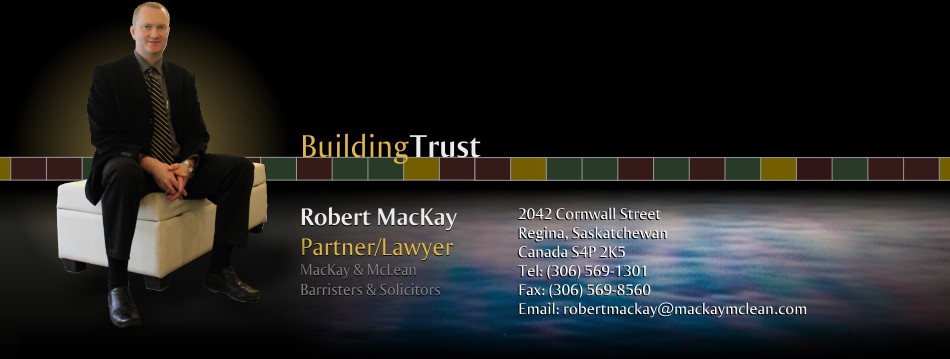When looking to buy, sell, or refinance a property, you need to hire somebody who is not a stranger to addressing the real estate needs of individuals and families. Robert MacKay is the man to call. ROBERT MacKay is your TRUSTED REGINA REAL ESTATE LAWYER!
Buying a home can be a stressful but exciting time. Robert Mackay, our Trusted Real Estate lawyer cautions about some potential scams when buying your home!
Real estate fraud can cause you to have large financial losses. If you are a victim of real estate fraud you may find out that you no longer own your home or that there have been additional mortgages taken out in your name.
There are two main types of real estate fraud that may result in financial loss:
Title fraud happens when the title to your home is stolen, and then the fraudster sells the home or applies for a new mortgage against it. Title fraud usually starts with identity theft, which can happen if somebody steals your personal information.
"Title insurance" is the best protection against this type of fraud. As well as protecting against title fraud, it also guards a new owner from against existing liens against a property's title (such as unpaid debts from utilities, mortgages and unpaid property taxes), encroachment issues (a structure on a property needs to be removed because it is on your neighbor's property) and errors in surveys and public records.

Foreclosure fraud usually happens when you are having problems making your mortgage payments. You may be tricked into transferring your property title to somebody to get a loan that will help you make your payments. Fraudsters usually keep the payments you make and also possess the title to your home, which they can resell or remortgage.
Two common scams that exploit a victim's need for cash are foreclosure fraud and home-equity fraud.
Cash-crunched property owners or investors seeking can be vulnerable to other scams or unscrupulous behavior to tap equity. There is always risk when leveraging properties, but a legitimate bank, broker or private lender should be forthright when explaining risks. However, those looking to borrow on equity should be alert for less scrupulous lenders, such as those who invite owners to embellish their application by exaggerating income, down payment or property assessment value sources in order to secure a larger loan.
Other types of scams you should be aware of include
In these scams, rental property is advertised (usually at low costs) on online classified sites like Craigslist or Kijiji. The ads use information and photos describing the property that has been "scraped" from legitimate ads, such as those on the MLS. A scammer will impersonate the landlord, property manager or estate agent and will respond to emails and calls from prospective tenants. The scammer indicates he or she is unable to meet a prospective renter at the property, and instead proposes a meeting off site to exchange keys, sign a tenancy agreement and collect rental deposits. Victims may only learn they've been duped when they show up at a property to discover that it is already occupied.
Things to be alert for in such listings include claims of urgency, such as "must sell now," promises of high returns or "low-cost/no-cost" financing. These sort of claims are usually too good to be true, and they also can be prevalent in off-line scams.
Educating yourself about property investment can be essential for success, but prospective investors should be alert and do their research on seminar providers. There are legitimate speakers and seminars that provide beneficial information, others exist primarily to take money from the credulous … and there are some that are in between.
One common type of seminar is designed to hook buyers into "sure-fire" investments that are promoted by the seminar hosts. Potential investors may be invited to these seminars through an ad in a newspaper or magazine, a phone call, an email or other method. These seminars may include a motivational speaker, an "investment expert" or a "self-made millionaire."
The basic advice, be skeptical of claims and do your due diligence before committing any money to an expensive course or investment.
Remember there are no get-rich-quick schemes: the only people who make money are the scammers.
For more questions and help with any legal property issues consult with our Trusted Regina Real Estate Lawyer Robert MacKay

Here is a list of more consumer tips by Robert MacKay
Robert MacKay's team provides professional, personalized service and with their assistance, you can rest assured that your real estate transactions will be handled with the utmost consideration and care.
They provide a full range of legal services including:
- Real Estate & Mortgages
- Wills & Estates
- Family Law & Divorce
- Commercial & Corporate Law
- Litigation & Personal Injury
ROBERT Mackay is your TRUSTED REGINA REAL ESTATE LAWYER!
